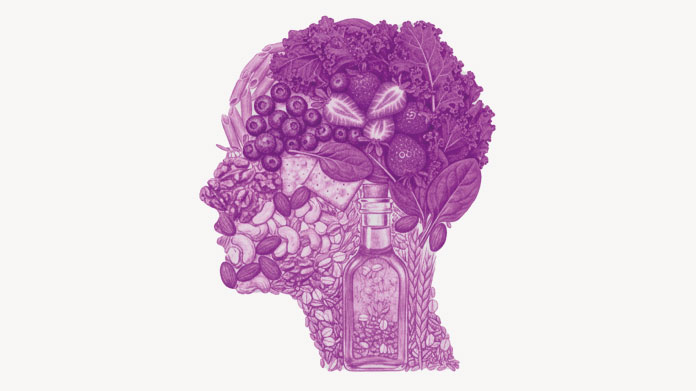Concentration: the 7 best supplements for the brain
Are you keen to think faster, more effectively and for longer? Discover the 7 most effective, natural ‘nootropic’ products for boosting your brain power.

Ginkgo biloba for cerebral circulation
Ginkgo is a tree from the conifer family. Often referred to as a ‘living fossil’, it has survived the extinction of the dinosaurs as well as the atomic bomb in Hiroshima.
In phytotherapy, it is the tree’s leaves which are used as they contain antioxidants (called flavonoids) as well as lactones which promote good micro-circulation.
Ginkgo biloba is thus known for supporting blood flow in the brain and cognitive function (1). Make sure you choose a ginkgo supplement with a high content of active ingredients (for example, extract of Ginkgo Biloba).
Iron supplements and cognitive function
Iron is a trace element essential for health. It is found in many foods including red meat, chicken livers and lentils. Among its many functions, iron helps maintain normal cognitive function (2).
Some people may be subject to varying degrees of iron deficiency , which can manifest in general fatigue, amongst others. In such cases, iron levels can be boosted by taking a supplement (such as Iron Bisglycinate), though it’s important to only do so if you have actually been diagnosed as iron-deficient.
Centella asiatica for improved concentration
Centella asiatica is an Indian plant also known as ‘tiger grass ’. With its high content of asiaticosides and madecassosides, it is used in Ayurvedic medicine as a brain tonic.
Centella asiatica does indeed help to support mental health and cognitive function (3). It also plays a role in cardiovascular health and wound-healing. For optimal concentration, choose a Centella asiatica supplement with a high content of asiaticosides and madecassosides (such as Centella asiatica).
Sulbutiamine, a derivative of vitamin B1
Vitamin B1, or thiamine, is recognized for supporting normal nervous system and psychological function as well as normal energy metabolism. But have you heard of its derivative, sulbutiamine?
This synthetic molecule is known to boost mental energy without having a stimulant effect. Sulbutiamine is available in supplement form (such as Sulbutiamine vegetarian capsules).
Think more effectively with a DHA supplement
DHA is a fatty acid from the omega-3 family. It helps maintain normal brain function. It is primarily found in oily fish such as salmon, mackerel and bluefin tuna.
To increase your DHA intake, choose a good quality fish oil produced from sustainable fishing sources (such as the supplement Super DHA).
The role of zinc in cognition
Zinc is a trace element essential for the metabolism of macronutrients – carbohydrates, fats and protein. It also supports normal cognitive function.
Zinc is actually a major modulator of intracellular and intercellular neuron signaling. The body’s zinc concentrations are highest in the brain, especially in the hippocampus, the area most important for learning and memory.
Oysters are the best dietary source of zinc but it’s also found in eggs, red meat and wholemeal bread. In addition, you can benefit from a higher zinc intake by taking a specific supplement (such as Zinc Orotate).
Bacopa monnieri for memory and brain reactivity
Bacopa monnieri is a plant that grows in the marshy regions of South-East Asia. It has been widely used in Ayurvedic medicine for more than 3000 years.
It is thought to have beneficial properties for supporting memory, cognitive function and mental health. Excellent for improving brain reactivity, this plant is usually ingested in the form of an extract of bacopa leaf (such as in the supplement Bacopa monnieri).
Concentration: an all-in-one nootropic supplement
Each of these nootropic substances offers individual benefits, but when combined, their effects are even more remarkable. That’s why synergistic formulations have been developed combining several of these elements.
The supplement Smart Pills, for example, contains two of the above-mentioned plants, Ginkgo biloba and Bacopa monnieri, along with caffeine anhydrous, B12, taurine and L-theanine. A perfect combination for helping you to be more focused, effective and clear in your work, your conversations or any other intellectual or manual activity !
Be sure to check out the other nootropic supplements offered by SuperSmart.
References
- Lee H, Birks JS. Ginkgo biloba for cognitive improvement in healthy individuals. Cochrane Database Syst Rev. 2018;2018(8):CD004671. Published 2018 Aug 3. doi:10.1002/14651858.CD004671.pub2
- Jáuregui-Lobera I. Iron deficiency and cognitive functions. Neuropsychiatr Dis Treat. 2014;10:2087-2095. Published 2014 Nov 10. doi:10.2147/NDT.S72491
- Puttarak P, Dilokthornsakul P, Saokaew S, et al. Effects of Centella asiatica (L.) Urb. on cognitive function and mood related outcomes: A Systematic Review and Meta-analysis. Sci Rep. 2017;7(1):10646. Published 2017 Sep 6. doi:10.1038/s41598-017-09823-9
- Starling-Soares B, Carrera-Bastos P, Bettendorff L. Role of the Synthetic B1 Vitamin Sulbutiamine on Health. J Nutr Metab. 2020;2020:9349063. Published 2020 Apr 20. doi:10.1155/2020/9349063
- Weiser MJ, Butt CM, Mohajeri MH. Docosahexaenoic Acid and Cognition throughout the Lifespan. Nutrients. 2016;8(2):99. Published 2016 Feb 17. doi:10.3390/nu8020099
- Brewer GJ. Copper excess, zinc deficiency, and cognition loss in Alzheimer's disease. Biofactors. 2012 Mar-Apr;38(2):107-13. doi: 10.1002/biof.1005. Epub 2012 Mar 22. PMID: 22438177.
- Kumar N, Abichandani LG, Thawani V, Gharpure KJ, Naidu MU, Venkat Ramana G. Efficacy of Standardized Extract of Bacopa monnieri (Bacognize®) on Cognitive Functions of Medical Students: A Six-Week, Randomized Placebo-Controlled Trial. Evid Based Complement Alternat Med. 2016;2016:4103423. doi:10.1155/2016/4103423
Keywords
24 Hours
repeat customer
recommended by my doctor. easy to create an account. Discounts and specials are appreciated. packaging and delivery is dependable. Capsules easy to digest. I've had some some capsules and tablets that are broken inside their bottles.
Kokee
5 Days
Order was shipped on time and packaged…Wonderful Jobs!
Order was shipped on time and packaged excellently.
DMHoge
11 Days
great products and prices
great products and prices
Marie
17 Days
Easy to navigate site
Easy to navigate site, had what I was searching for, good price. easy order-check out
James Tucker
23 Days
My skin is clearing up nicely!
Pretty good for my skin so far.
Christian
25 Days
The new packaging is excellent
The new packaging is excellent - finally! No more squashed boxes and torn envelopes.
GORAN
26 Days
Great Product
Great Product
Larry Garrett
31 Days
Quick shipping
Quick shipping; good price. No issues!
Mary McCarty
32 Days
Thr product is very good and is helping…
Thr product is very good and is helping me on my health. Then is always on time
LUGO Luz
35 Days
Buying was fine
Buying was fine. I had problems with the website not recognizing my login info, and had to call to get it fixed. Other than that, everything was good.
David S. Clark
35 Days
Your super maca and super ginseng are…phenomenal
Your super maca and super ginseng are phenomenal supplements that compliment each other when taking them together. Fantastic feeling of well-being and lots of mid day energy without the crash.
Keith Mason
38 Days
I have had amazing results with every…
I have had amazing results with every supplement I've purchased. I am extremely satisfied with this company
kirstin Torres
38 Days
Fine products
Fine products . They are on the leading edge of online supplements. The only issue -so far-is they sometime run out of subscription items.
Jason Argos
40 Days
The ordering process is very user…
The ordering process is very user friendly and the products always come in a timely manner.
CARTER Rhonda
41 Days
The price for Dr
The price for Dr. Pero's AC-11 is reasonable and in line with his views. (my former colleague). Keep it pure.
CAMPBELL Clayton




